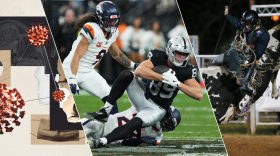The argument keeps changing, but this one is still out there: COVID-19 is no more dangerous than your garden-variety flu.
If people aren’t saying it, they’re showing it by showing up en mass at public beaches, bars and holiday weekend gatherings - not wearing masks.
In Clark County, the rate of infection seems to have declined, and for a stretch of a couple of days, no one has died of COVID-19. Although, one new death was reported Friday.
But the number of people who have died tell a story that could, once and for all, end the debate over whether the coronavirus is just as deadly as the seasonal flu.
According to the Southern Nevada Health District from November 2018 to August 2019, 62 people died from influenza and 980 people were hospitalized. The year before 39 people died and 980 hospitalizations.
Compare that with just the last three months, from about February to the end of May, Southern Nevada has had 340 deaths from COVID-19. That’s almost 10 times the number of regular flu deaths from two years ago and five times the number of flu deaths from a year ago.
"We can definitely say that COVID-19 is more severe than garden-variety influenza," said Dr. Vit Kraushaar, a medical investigator with the Southern Nevada Health Department.
Dr. Kraushaar said doctors and researchers are still learning a lot about how this virus works, but they do know a lot more than they did even just a few months ago.
One of the things that they have learned about COVID-19 is unlike the flu, which generally just attacks the lungs, it attacks more systems in the body.
"We see other things. There have been reports of a hypercoagulable state that happens. So, basically people are more prone to developing blood clots. Younger people have been reported to have had strokes," he said.
Even in children, who were originally thought to be less impacted by the virus, there are more reports of an inflammatory disease connected to the coronavirus.
Dr. Kraushaar said at the beginning of the outbreak keeping up with the testing, reports of cases and questions from health care providers was difficult.
He said people working on call at the health district didn't really get a break because the calls were non-stop. However, that has changed as testing and tracing of cases has improved.
"It sort of caught us all off guard and we were all having to ramp up things very quickly," he said, "We didn't have any systems in place to monitor COVID-19 as we did for things like influenza but as time as gone on we've definitely expanded our capacity."
Now that those systems are in place, Kraushaar believes health officials do have a better handle on the outbreak but he thinks there are areas for improvement, including trying to contact everyone who tests positive and trace their contacts.
Despite the improvements, he wants to remind people there are still a lot of unknowns.
"One thing about this disease is that it's unpredictable," he said, "We've seen that the number of cases and hospitalizations, and to less extent, deaths have been trending down but I think that is mainly because of the social distancing measure that were put in place."
Dr. Kraushaar notes that as we see the social distancing measures lifted there could be an increase in cases.
"We're a little bit wary that things could escalate again," he said.
And as the casinos begin to reopen, health officials are watching closely what measures get put in place and how effective those measures really are.
"Our response is going to have to fluid," he said, "If we start to see more cases pop up in certain types of venues, then we're probably going to have to work with everyone to put out new recommendations or to try and alter the strategies to prevent transmission."
Dr. Kraushaar is hopeful that we have a vaccine for the virus this fall or winter but he said health officials like hope for the best but prepared for the worst - and the worst-case scenario is that we won't have a vaccine for a while.
Dr. Vit Kraushaar, medical investigator, Southern Nevada Health Department.









